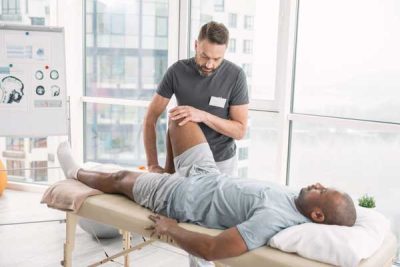Returning to Regular Exercise Post-Surgery
Advertiser Content
Returning to Regular Exercise Post-Surgery? Proceed with Caution
 The beginning of a new year prompts many people to start or resume healthy habits as part of a lifestyle overhaul. For many people, that involves diet and exercise as they seek to shed those few holiday pounds (or more!).
The beginning of a new year prompts many people to start or resume healthy habits as part of a lifestyle overhaul. For many people, that involves diet and exercise as they seek to shed those few holiday pounds (or more!).
But those who have suffered an injury, illness or other condition that knocked them out of action need to take some precautions before recommitting to their usual fitness routine. And determining when you should get back to regular exercise is just as important as how.
We strongly recommend that such patients first check with their physician to develop a judicious plan. A jogger or runner who is recovering from a leg injury should know that they won’t be back to those 3- to 5-mile routines immediately (at least not at the pace to which they have become accustomed); similarly, a pickleball or tennis enthusiast who’s had shoulder surgery will need focused training to get back into the game.
Remember to Stretch
At our practice, we often go through proactive prehab sessions with patients before they have surgery. Prehab involves therapy-based movements and exercises designed to help address deficits in strength, stability, range of motion, balance and overall joint function – an approach that can pay dividends during the recovery phase.
Proper stretching before beginning to exercise is vitally important, regardless of whether you’re recovering from a health issue. As orthopedic surgeon Dr. Steven Andelman wrote in a previous blog: “About half of the 33 million musculoskeletal injuries in the U.S. every year involve tendons and ligaments. Add in a lack of conditioning, especially after a period of inactivity, and the risk of injury goes way up.”
Stretching helps to maintain range of motion, flexibility, and good posture and decreases the likelihood of injury during athletic activities. It can even help to improve balance and walking quality.
To truly experience all the benefits, we recommend stretching at least 10 to 15 minutes a day, starting as soon as you wake up. Stretching first thing in the morning can help decrease stiffness after lying in bed all night. You’ll want to incorporate some stretches throughout the day as well.
Pace Yourself
Unlike muscles, which heal very quickly, our tendons and ligaments are more fibrous and take longer to repair and heal. After an injury it sometimes can take 6 to 9 months before you feel ready to go back to sports or exercise class. A further complication comes if you’ve been on crutches, as your muscles will get even weaker and delay your return to regular exercise. Naturally, our muscles become stiffer and weaker with age; in general, people should stretch more as they grow older.
As is often true with new dieters, there is a tendency to go full throttle when you start, or return to, an exercise routine. Just as that approach usually fails with dieters, it rarely works well with exercise. Instead, by working your way up to your goal in increments, you will avoid overtiring and be more likely to stick with your plan. Start slowly: 10 to 15 minutes a day. When you feel comfortable, slowly increase your activity. If you experience unusual pain – something that lasts for more than a week or so – see your physician or physical therapist.
Walking also remains an excellent means of exercise and can be a great aid in building your endurance for more strenuous activity. It may not strike someone who bikes 100 miles or more a week as particularly exciting, but again: a slow and prudent approach is the best one.
None of this is meant to discourage you from exercising; instead, we want you to do so carefully to avoid further injury, and to eventually establish, or return to, a healthy standard.
 Adam Cohen is a physical therapist with the Burke Rehabilitation Hospital and practice manager of WPHPA Rehabilitation Services in West Harrison.
Adam Cohen is a physical therapist with the Burke Rehabilitation Hospital and practice manager of WPHPA Rehabilitation Services in West Harrison.
For an appointment, call 914-681-1116.

Examiner Media – Keeping you informed with professionally-reported local news, features, and sports coverage.
